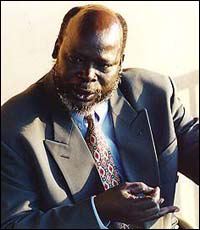 |
| Vol. 1 No. 11 | November 1999 |
There are growing indications that Washington is now backing the establishment of an independent state in the south of Sudan. US support for the opposition in south Sudan, efforts to isolate the government in Khartoum and diplomatic initiatives designed to legitimize the south's secession have all been reinvigorated in recent months.
Aid to SPLA
 |
| SPLA leader John Garang |
The increase in humanitarian aid is clearly designed to allow the SPLA to spend more of its meager funds on military equipment. This will help make up for a considerable shortfall in support for the SPLA coming in from neighboring countries. Support for the group by Ethiopia and Eritrea has tapered off somewhat since the outbreak of war between the two countries, while Uganda, the most pro-SPLA country in the region, is deeply embroiled in the Congo conflict and has fewer resources to spare.
According to unconfirmed reports obtained by MEIB, Albright and Garang discussed SPLA plans to capture the southern capital of Juba in advance of negotiations with the Sudanese government. Whether the US is considering further steps to bolster the SPLA is unclear, but it is certainly facing tremendous congressional pressure to do so. A resolution passed by the US House of Representatives in June explicitly called upon Clinton to arm the SPLA and establish no-fly zones in areas under its control.
Efforts to Isolate Khartoum
During her trip to Africa, Albright also pledged to put pressure on countries not to invest in Sudan's fledgling oil industry. "There are countries that believe (that) if a government that is dictatorial has more money, that some of it will filter to the people. It doesn't happen that way," said Albright. "I'm definitely going to discuss this with the Canadians," she added, referring to Calgary-based Talisman Energy Inc., which has a 25% stake in a southern Sudan oil consortium (Chinese and Malaysian companies are other big investors). The Clinton administration prohibited American companies from investment in Sudan in November 1997.
Congressional leaders are prodding the Clinton administration take further steps to isolate Khartoum, such as introducing a UN Security Council resolution that would impose an arms embargo on the government.
The IGAD initiative
In perhaps the most important policy shift, Albright announced that that future peace negotiations between Khartoum and the SPLA must be exclusively within the framework of talks sponsored by IGAD (the Inter-governmental Authority on Development). This is considered to be a major concession to the SPLA because the IGAD initiative treats the problem as an ethno-sectarian conflict between the north and south of Sudan-- a framework that inherently legitimizes the prospect of secession.
Khartoum originally accepted the IGAD initiative in September 1993, apparently believing that its close relations with two of the IGAD member states (Eritrea and Ethiopia) would counterbalance the role of US allies Kenya and Uganda (the other two members of IGAD, minuscule Djibouti and war-ridden Somalia have virtually no influence). Sudan's relations with Ethiopia and Eritrea have deteriorated dramatically since then, however. Both countries now support the SPLA. In 1996-97, both intervened directly (along with Uganda) in support of a major three-pronged SPLA offensive against government forces. Now monopolized by US allies, the IGAD initiative has increasingly come to favor the position of the SPLA.
In an effort to help Khartoum out of this log jam, Egypt and Libya recently proposed an alternative plan for comprehensive multilateral negotiations among representatives of all major Sudanese opposition groups (both in the north and the south of the country) and the government. By treating the issue of the south as merely one dispute among many dividing the Sudanese government and the opposition, the initiative inherently endorses a one-state solution. Indeed, Egypt brought forward this alternative negotiating framework precisely because it has a strong interest in maintaining the unity of Sudan--partition of the country would force Egypt to renegotiate treaties governing use of water from the Nile River. Egyptian Foreign Minister Amr Moussa said earlier this month that the secession of south Sudan is a "red line" that his government will not tolerate.1
Due in part to US encouragement, the SPLA is now unwilling to consider alternative negotiating frameworks. It has refused even to name a representative to the opposition delegation that will carry out the negotiations with Khartoum in accordance with the Egyptian-Libyan initiative.
Although US officials have been unenthusiastic about the Egyptian-Libyan initiative from the very beginning, Albright had not explicitly rejected it until her trip to Africa last month. "The only way to deal with the problem in Sudan is through the IGAD process," said Albright after her return. "[We] are not supporting other alternative initiatives."2 Egyptian officials are reportedly fuming over this rebuff--prompting one Arabic newspaper to speak of an "undeclared crisis" in Egyptian-American relations.3 During his recent visit to Cairo, the US special envoy for Sudan, Harry Johnston, was denied a meeting with Mubarak.
As one Sudanese commentator recently remarked, the IGAD iniative has become an "international trusteeship" with exclusive control over the Sudan issue.4 Albright seems intent to keep it that way.
1 Akhbar al-Khaleej, 3 November 1999.
2 Secretary of State Madeleine K. Albright, "On-the-Record Briefing on Her Trip to Africa, CTNT and Resources," as released by the Office of the Spokesman, US Department of State.
3 Al-Sharq al-Awsat, 29 October 1999.
4 Al-Quds al-Arabi, 26 October 1999.